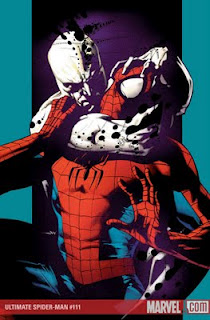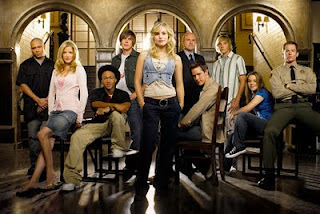James Willetts continues his weekly analysis of the Marvel Universe Miracle Day. Don’t forget this week’s podcast commentary, available immediately after the UK broadcast, tomorrow evening!
When I was a student I discovered a series that I instantly fell in love with. It was a genre bending mash up of Raymond Chandler-esque gumshoe investigation and teen drama, in a fresh and vibrant school setting. The first two seasons involved an ongoing plot arc but the third, faced with cancellation and troubled budgeting, featured two shorter mini-arcs – an elegant mix between episode-of-the-week shenanigans and a more involved season arc which meant the producers had a chance to tell two final stories rather than one.
The reason I bring this up is because we’re now four episodes into Torchwood: Miracle Day and nothing has happened since the first ten minutes. Now, this may be the most meta of stories: a plot that shambles on long after it should have died may be a novel way to demonstrate the problems of a world in which death is no more, but somehow, I don’t think so.
There’s a concept in modern comics (especially the comics of Brian Michael Bendis) called “decompression”. What would once have filled a single issue now gets stretched out into six and, depending on where you stand on comics in which no one hits anyone else and two people spend half the time talking to one another, it’s either brilliant or terrible.
Personally, I’m one of the people who think that comics can only benefit from decompression, but that’s because I’m the kind of industry-killing tightwad who waits for the trade to come out, so all six issues are collected into one handy, easily readable story. In this format, much like devouring a box set of TV, it’s easy to accept all those annoying one off issues in which nothing much happens.
To be fair, if you’re reading these month by month they can’t help but be irritating. Bendis has an especial habit of breaking off each arc with two characters having an intense and (usually) necessary conversation, which may be great as a breather between action beats but can fall flat if you’ve just paid £3 to read a story in which the Avengers punch a space dragon in the snout. The perfect example of this has to be in Ultimate Spider-Man 111, when Peter reveals to his Aunt May that he is Spider-Man and totally changes the trajectory of the story.
Fortunately, Bendis is good at writing these but, in the wrong hands, it can be terrible. Dull, flat nothingness in the middle of another story entirely. If you want to see the downside of decompressed writing, where nothing happens over entire episodes, look no further than Torchwood – the most obvious example of writing for the DVD box set.
To call the pacing slow would be to ignore the fact that it’s not even moved. In every episode we have learnt exactly one thing that advances the plot. Veronica Mars divided a season that could have been one long arc into two smaller stories. Torchwood should have split itself into two mini-series of five episodes.
This is the Americans again of course. British brevity being what it is there is no way the BBC alone would have commissioned a 10 episode mini-series. That’s not a British mini-series. A British mini-series is the length of Sherlock; three episodes reduced from six. Children of Earth never let up, even for a minute. There was so much crammed into those five episodes that you barely had time to breathe*.
In comparison, whenever Miracle Day reveals something interesting, it’s forced to back off and let time pass before it can continue. Oswald Danes is a bad guy? Well, let’s all go to LA. The CIA boss is being controlled by a sinister covert conspiracy, but let’s all just ignore that for now.** So little happens that each episode could be boiled down into a ‘previously on’ without losing anything at all.
Blah blah blah – Torchwood is booooooooooooooorinnnnnnnnng.
Anyway, on to the good stuff. I’m pleased to see that someone has taken the time to think up a way to dispose of the undying, although I still think there are easier ways to do it***. That final eye scream was great, but I’m a little unsure why these minor characters are being introduced and disposed of in an episode. In the same way that Dichen Lachen’s character from ‘Rendition’ was the most interesting thing on screen, Tea Party Lady was far more engaging than any of the heroes. In fact, all of the villains have chewed their way through the scenery and been genuinely watchable. It’s a pity that others’ reactions to them are so off. (Would you really let the child killing paedophile handle the baby? Are people really allowed to just wander around an acknowledged ‘plague ship’?)
In fact, the idea of these plague hospitals and the containment camps that they presage saw the first few flickers of life in an episode that has mostly demonstrated yet again why Esther should never have been allowed a job in the intelligence community. Even by the standards of generally inept TV spies she has to be the worst. The fact that Rex doesn’t shoot her in the face speaks for his superhuman patience.
Oswald Danes and Poison Ivy remain the only real reason to watch the series. Where the American leads have maintained a solid attempt at creating a vacuum of charisma and fun, Bill Pullman has been turning every scene into a showcase of just what you can do with an underwritten character. The fact that Poison Ivy is apparently schizophrenic is irrelevant. These are not characters to be analysed, but enjoyed.
We also get a plodding heist movie sequence which has been done better by almost everyone else – as the podcast pointed out, most notably in the Charlie’s Angels movies.
However, the highlight of the week has to go to Gwen for an American accent so ear grindingly abysmal that even acknowledging it as terrible in the episode doesn’t make up for its awfulness. And next week sees the return of Gwen’s post-apocalyptic handy cam, so it must be serious. Good job she sneaked that across to America or we couldn’t rehash the good bits from the last mini-series.
*The scheduling for Children of Earth helped; a five episode mini-series across five nights in a row is far pacier than a 10 episode mini-series across 10 weeks as, whatever momentum you gain in one episode is lost by the start of the next. When you have no momentum whatsoever anyway, you start to sink into negative advancement. There are only so many times I can stand to see someone realise Oswald isn’t that bad, or big pharmaceuticals are evil, or Rex is still bleeding before I begin to wonder if this is all just a change in the Matrix and I’m suffering from an extreme case of déjà vu.
**Torchwood (the agency and the programme) does have a precedent here. ‘Sleeper’, an episode from Season 2, still doesn’t have a resolution. The implied alien invasion has just been ignored ever since.
***On Twitter, where I live-tweet the episodes, I came up with 10 foolproof ways of actually killing the deathless, only one of which might not work. Three of them even had the advantage of restarting the NASA space project.




